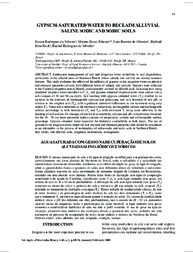Gypsum-saturated water to reclaim alluvial saline sodic and sodic soils.
Gypsum-saturated water to reclaim alluvial saline sodic and sodic soils.
Summary: Inadequate management of soil and irrigation water contribute to soil degradation, particularly in the alluvial areas of Northeast Brazil, where salinity and sodicity are already common features. This study evaluates the effects of the addition of gypsum in the irrigation water on physical and chemical properties of soils with different levels of salinity and sodicity. Samples were collected at the Custódia irrigation area of Brazil, predominantly covered by alluvial soils. Leaching tests using simulated irrigation water classified as C3S1, and gypsum-saturated irrigation water were carried out in soil columns of 20 and 50 cm depth. Soil leaching with gypsum saturated water (T2) resulted in an increase in the amounts of exchangeable calcium and potassium, and in a decrease of soil pH, in relation to the original soil (T0), with significant statistical differences to the treatment using only water (T1). There was a reduction in the electrical conductivity, exchangeable sodium and exchangeable sodium percentage in both treatments (T1 and T2), with treatment T2 being more effective in the leaching of soil sodium. No changes of electrical conductivity, calcium and pH in depth were observed, but the 20 - 50 cm layer presented higher amounts of magnesium, sodium and exchangeable sodium percentage. Gypsum saturated water improved the hydraulic conductivity in both layers. The use of gypsum in the irrigation water improved soil physical and chemical properties and should be considered as an alternative in the process of reclamation of saline-sodic and sodic soils in Northeast Brazil.
Publication year: 2008
Types of publication: Journal article
Unit: Embrapa Soils
Keywords: Irrigação, Manejo do Solo
Observation
Some of Embrapa's publications are published as ePub files. To read them, use or download one of the following free software options to your computer or mobile device. Android: Google Play Books; IOS: iBooks; Windows and Linux: Calibre.
Access other publications
Access the Agricultural Research Database (BDPA) to consult Embrapa's full library collection and records.
Visit Embrapa Bookstore to purchase books and other publications sold by Embrapa.

